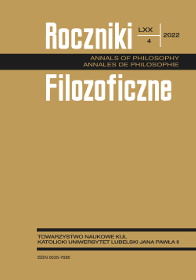Hobbes a religijna wolność
Abstrakt
Artykuł omawia trzy aspekty Hobbesowskiej obrony wolności religijnej. Część pierwsza zawiera analizę głównego stanowiska Hobbesa na temat wolności sumienia i praktyk religijnych. Autor pokazuje w niej, w jaki sposób Hobbes, za pomocą charakterystycznej dla niego strategii redukcjonistycznej, stara się przekonać swoich czytelników, że w państwie absolutnym jest nadal miejsce na wolność sumienia i praktyk religijnych – pod każdym względem, który powinien mieć dla nich znaczenie. W części drugiej autor przechodzi do Hobbesowskiej pochwały niezależności i podejmuje zagadnienie, czy jest ona zgodna z jego głównym stanowiskiem. Jak argumentuje, uzupełnia ona to stanowisko i w zasadzie od niego nie odbiega. Ostatnia część dotyczy wciąż fascynującej kwestii relacji między dojrzałą Locke’owską obroną tolerancji religijnej a poglądami jego wielkiego prekursora w ramach tradycji umowy społecznej. Nie próbując pomniejszać różnic między Lockiem a Hobbesem, autor argumentuje, że Locke potrafi zaadoptować wątki Hobbesowskie dla swoich własnych oryginalnych celów.
Bibliografia
Bramhall, John. The Works of the Most Reverend Father in God, John Bramhall D.D. Vol. 4. Oxford: John Henry Parker, 1844.
Collins, Jeffrey. In the Shadow of Leviathan: John Locke and the Politics of Conscience. Cambridge: Cambridge University Press, 2020.
Cranston, Maurice. John Locke: A Biography. London: Longmans, 1957.
Hampton, Jean. Hobbes and the Social Contract Tradition. Cambridge: Cambridge University Press, 1986.
Higgins-Biddle, John, ed. Introduction to John Locke: The Reasonableness of Christianity as Delivered in the Scriptures, xv–cxv.Oxford: Clarendon Press, 1999.
Jackson, Nicholas. Hobbes, Bramhall, and the Politics of Liberty and Necessity: A Quarrel of the Civil Wars and Interregnum. Cambridge: Cambridge University Press, 2007.
Jolley, Nicholas. Toleration and Understanding in Locke (Oxford: Oxford University Press, 2016), 73–74.
Klibansky, Raymond, and John W. Gough, eds. John Locke: Epistola de Tolerantia/A Letter on Toleration. Oxford: Clarendon Press, 1968.
Marshall, John. “The Ecclesiology of the Latitude-Men 1660–1689: Stillingfleet, Tillotson, and ‘Hobbism’.” Journal of Ecclesiastical History 36 (1985): 407–27.
Martinich, A. P. Hobbes: A Biography. Cambridge: Cambridge University Press, 1999.
Martinich, A. P. The Two Gods of Leviathan. Cambridge: Cambridge University Press, 1992.
Ryan, Alan. “Hobbes’s Political Philosophy.” In The Cambridge Companion to Hobbes, edited by Tom Sorell, 208–45. Cambridge: Cambridge University Press, 1996.
Tuck, Richard. “Hobbes and Locke on Toleration.” Thomas Hobbes and Political Theory, edited by Mary G. Dietz (Lawrence, KS: University Press of Kansas, 1990), 153–71.
Vernon, Richard, ed. Locke on Toleration. Cambridge: Cambridge University Press, 2010.
Whipple, John. “Hobbes on Miracles.” Pacific Philosophical Quarterly 89 (2008): 117–42.
Copyright (c) 2022 Roczniki Filozoficzne

Utwór dostępny jest na licencji Creative Commons Uznanie autorstwa – Użycie niekomercyjne – Bez utworów zależnych 4.0 Międzynarodowe.





